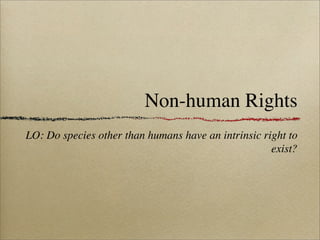
Environmental Ethics 4
- 1. Non-human Rights LO: Do species other than humans have an intrinsic right to exist?
- 2. Complete the sentences Anthropocentrism means ... One argument for anthropocentric environmentalism is ... A conservationist would say that Chernobyl ... One challenge to human-centred environmentalism might be ...
- 4. Non-human rights Are human beings really morally superior to members of other species?
- 5. Non-human rights Are there rational arguments for Are human beings assigning intrinsic really morally value to the superior to members natural of other species? environment and non-humans?
- 6. Speceism “If a being suffers, there can be no moral justification for refusing to take that suffering into consideration. No matter what the nature of the being, the principle of equality requires that the suffering be counted equally with the like Peter Singer (b. 1946) suffering.” Utilitarian philosopher
- 7. Speceism “If possessing a higher intelligence does not entitle one human to use another for his own ends, how can it entitle humans to exploit non- humans for the same purpose?” ‘Equality for Animals’, in Practical Peter Singer (b. 1946) Ethics (1979) Utilitarian philosopher
- 8. Peter Singer talks to Andrew Marr (Sorry about the sound of typing!!!) Listen carefully to the interview. Write down the answers to the following questions: 1. What is speceism? 2. Why does Singer not like the term “animal rights”? 3. What (and when) were the triggers for the British animal rights movement? 4. How much has changed since the 1970s? 5. What does Singer think about the situation in China? 6. Do you agree that God has “dropped out” of the environmental equation? 7. What about animal testing?
- 9. the subject of a life is an individual who cares about his or her life, which has inherent value which does not come in degrees and is not dependent on the individual’s experiences or utility to others What’s wrong with the way animals are treated isn’t the details that vary from case to case. It’s the whole system. The forelorness of the veal calf is pathetic, heart-wrenching; the pulsating pain of the chimp with electrodes planted deep in her brain is repulsive; the slow, torturous death of the raccoon caught in the leg hold trap os Tom Regan (b. 1938) agonizing. But what is wrong isn’t the pain, isn’t the suffering, isn’t the deprivation. These compound what’s wrong. Sometimes, often, The Case for Animal they make it much, much worse. But they are not the fundamental Rights (1984) wrong. The fundamental wrong is the system that allows us to view animals as our resources, here for us - to be eaten, or surgically manipulated, or exploited for sport or money. Once we accept this view of animals as our resources, the rest is as predictable as it is regrettable.
- 10. Taylor uses Kantian ethical theory to argue that animals have a “good of their own”, which humans have a duty to respect. By adopting this attitude, we will be disposed to give respectful consideration to their existence, and also to see ourselves as bearing a special relationship to them. Treating living things as ends in themselves rather than as mere means to human ends. Practices and policies aimed at specific ways of preserving natural ecosystems and ensuring physical environment as beneficial as possible to as many species as possible. Paul Taylor (b. 1943)
- 11. “But a full-grown horse or dog is beyond comparison a more rational, as well as a more conversable, animal than an infant of a day or a week or even a month old. But suppose they were otherwise, what would it available? The question is not can they reason? nor can they talk? but can they suffer? Jeremy Bentham (1748-1832) Consider this quote with reference to utilitarianism, anthropocentrism and non-human rights.